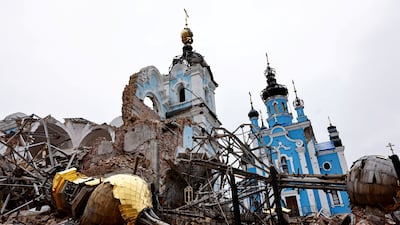EU officials have expressed hope that the bloc's 27 defence ministers will confirm their readiness to top up the fund used to purchase weapons for Ukraine by €3.5 billion ($3.7 billion).
The ministers will meet in Brussels on a Monday, at a time that Ukraine is facing the “most dangerous” phase of the war with Russia, the officials said.
“We would like to get […] the green light to prepare for such a possible decision,” said a senior EU official. “It will require more detailed discussions at a technical level. It’s not a modest sum of money.”
Another said that it was “crucial” to send ammunitions because Ukraine had entered “the most dangerous phase since the start of the conflict”.
They highlighted the need to shore up Ukraine's frontline resistance in the face of a “massive Russian surge with more than 300,000 fighters”.
Fighting is now concentrated in the eastern Donetsk enclave of Ukraine, particularly in the city of Bakhmut.
Russian President Vladimir Putin made a surprise trip to Mariupol on Sunday, his first visit to territory captured from Ukraine since Moscow's offensive began last year.
EU countries have depleted their weapons to help Ukraine, which currently needs about half a million shells a month but only uses a fraction of that amount due to insufficient stocks.
A third senior EU official said that the continent's industry needed to adapt to a “war economy”.
“There is a big discrepancy between what was considered business as usual in peace times, before the return of high intensity combat at the borders of Europe, and what we need today. So, we need to fix that big gap,” the official said.
News website Politico reported that EU ambassadors reached a preliminary deal on Sunday to supply Kyiv with a million 155mm shells over the next year.
Europe's defence ministers are expected to discuss a three-way approach to hasten joint purchases of artillery ammunition within the bloc — a plan put forward earlier this month by the EU’s top diplomat Josep Borrell.
The proposal includes the allocation of €1 billion ($1.07 billion) towards the partial reimbursement of the immediate delivery to Ukraine of ammunition — either of western or Soviet standard — from national stocks or pending orders.
It also calls for the allocation of another €1 billion for the reimbursement of ammunition bought either by the European Defence Agency or by an EU country on behalf of three others from the European defence industry.
Finally, the plan highlights the need to hasten the production of 155mm ammunition in 15 factories in 11 EU countries.
EU Internal Market Commissioner Thierry Breton has embarked on a tour of European factories to assess their capabilities, including a visit to Serbia last week.
Mr Breton said Europe’s defence productivity could increase by 17 per cent this year.
“The current European production base is at maximum production capacity because we have all the orders placed by member states,” a senior EU official said.
“Prices are spiralling and average production time is quite long: It takes around one year to get a shell delivered. This is, of course, concerning.”
The EU hopes that the first joint orders for ammunitions from the 15 factories will be made by the end of May.
“We’ll have to negotiate quantities, price and delivery time — a bit like we did during Covid [for vaccines],” a senior EU official said.
“The aim is to reduce delivery times., thanks to large orders. What we want is economies of scale.”
So far, the EU has committed €13 billion of military support for Ukraine through institutions in the bloc and on a bilateral basis.














